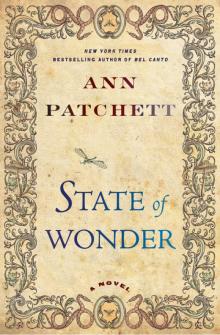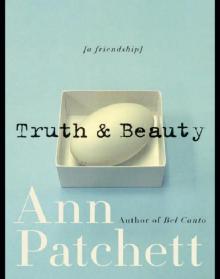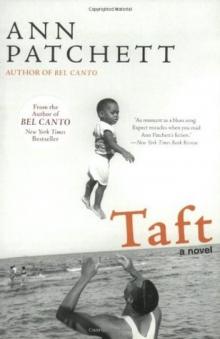- Home
- Ann Patchett
Taft Page 20
Taft Read online
Page 20
At this the boy takes a big automatic step backwards. "My dad dropped me off and he's picking me back up again."
Taft had no intention of making the boy all nervous. It's awful the way kids have to be so scared of everybody these days. "Who's your dad?" he says, trying to sound nice, not that he would know his dad in a million years.
"Tommy Lawson," the boy says.
At this Taft smiles, big and open. For reasons he can't exactly name, this is the best news he's heard all day. He squats down and makes himself shorter than the boy. "Tommy Lawson at Royal Hill Carpet?"
"Yeah," the boy says suspiciously. He is a good looking boy, Taft sees that now. Pretty skin and big, round eyes. He can see how he looks like Lawson.
"Well, I know him. I work with him. Me and your dad are friends." Taft hasn't seen nearly as much of Tommy since he came back to work after losing those two fingers in the accident. He was mostly doing cleanup now, nothing with machinery. He was lucky, really, that he got to keep his job.
"You make carpet?" the boy says.
"Sure do. What's your name?"
"Tommy," the boy says. "Who are you?"
"Levon Taft," he says. "Ask your dad. He knows me."
"Taft," the boy says.
"You want to come in and have a Coke, Tommy?"
The boy looks torn now. It's hot enough outside to make a person sick at his stomach and by the nearly full box of candy Taft can tell he hasn't been having much luck with sales. "I'm not supposed to go inside anywhere."
Taft nods. There's no point in trying to talk him into it. It's a good rule. If Tommy Lawson was teaching his kids not to go inside with strangers then he shouldn't be trying to undo it. "I'll tell you what. I'll get you one and you can drink it out here if you want."
Tommy likes this idea. Taft thinks it must be his day for compromise. "Okay," Tommy says.
Taft goes back into the kitchen and gets out a bottle of Coke and his half a Budweiser. It's one thing not to drink in front of your own kids, but it didn't make much difference if they were somebody else's. He brings the drinks outside and sits down on the porch next to Tommy. "You want me to get that? Here," Taft says, and pulls off the crown cap for him.
"It's hot," Tommy says.
"It sure is that." It's only the first of June, but it's hotter today than it is in August. They sit there and drink their drinks for a while. Taft wonders what the neighbors would think if they came walking by right now, what his wife and his kids would think, and he laughs a little.
"What's funny?" Tommy says.
"Not a thing. How sales been going?"
"Slow," he says, and kicks the box lightly with the toe of his shoe.
"What's the money for?"
"Skeleton," he says. "The science teacher thinks we need to have a skeleton."
That seems pretty advanced to Taft, a bunch of little kids looking at a skeleton.
"You want a skeleton?" Taft asks.
"I want a bicycle."
Taft nods. There probably wasn't much chance of a bicycle for Tommy since his father's problems at the plant. "How's your dad doing?"
Tommy looks up at him and squints. "I thought you knew him."
"I do, I just haven't seen him in a while."
"He's okay. He had an accident, you know. He lost two fingers." Tommy holds up his left hand with the index finger and middle finger bent back so you can't see them. Taft thinks there might be nicer ways of talking about your father's problems, but who knew what kids were thinking about.
"Hell of a thing," Taft says.
"Hell of a thing," Tommy says back to him. "You got all your fingers?"
Taft puts down his beer can and holds up his hands. "Ten of them."
"My dad says that it happens to people who work in the factory all the time and so I shouldn't mind it."
"Well, he's right," Taft says. "It just hasn't happened to me yet. I expect it will sooner or later."
"I'm not going to make carpet when I grow up because I'm going to play basketball like Michael Jordan." Tommy brings his hands up and shoots a free throw from the line. "Got to have all your fingers to be a basketball player."
Taft is thinking about the black boy at the wrestling meet in Memphis, the boy who beat Carl. Taft is thinking how much he hated that boy, how much the very sight of him on the mat had made Taft hate him, but this boy, little Tommy Lawson, Taft likes fine. He wouldn't have any objections to having this boy around, so polite, so nice. And he's smaller. Taft likes them better when they're smaller.
"I oughta go," Tommy says, tilting back his Coke bottle to get to what's left in the bottom. "The chocolate's getting mushy. Thanks for the Coke." He stands up and goes for his box.
"Wait a minute," Taft says. "I've got to buy some."
"You said you didn't want to."
"That's before I got to know you. I didn't know you were Tommy Lawson's son."
"You want one?"
"I want four. There are four of us who live here. Me and my wife and my boy and girl."
"Four!" Tommy says, like every problem he had in the world has been solved. "I haven't sold four all day."
"Well, you have now. Do you know how much four cost?" He's just testing him, seeing how good he is in math.
"Six dollars."
Taft opens up his wallet, but he only has a five. Sometimes there's some change in the drawer next to the stove. Taft goes inside and sifts around through some junk until he comes up with eighty cents. Then he goes into Fay's room and takes two dimes out of the jar of change she keeps on her dresser. "I got it," he calls out, and comes back into the kitchen.
But Tommy's right behind him. "It's nice in here," he says.
"I thought you didn't come inside." Taft thinks the boy should have asked, not just come right in. If you say you don't come inside then you don't.
"I figured if you were buying four candy bars you were okay."
Taft hands him the five and the pile of change and the boy lays four soft candy bars side by side on the kitchen table. It's a lot of money to pay for candy. They're extra big, but you can get candy bars that size for seventy-five cents apiece at the Kroger. He walks Tommy to the door. It would have been plenty to buy one. Taft could kick himself. This is where the money goes.
But once they're back outside and he feels how hot it is and thinks about how rotten it's going to be going up and down the street, he starts to feel sorry for Tommy all over again. "Look," Taft says. "You need to be more specific. Don't say you're selling them for your school. Tell people that you're raising the money to buy a skeleton for your science class. Tell them that you want to be a doctor when you grow up and so you need to have a skeleton in your school. People like to know where their money's going."
"But I don't want to be a doctor. I want to play basketball."
"Doesn't matter. I'm not telling you to lie, I'm just saying people want to make some sort of connection. They want to think that if they buy the candy bar and you get the skeleton then maybe you'll be a doctor. It makes them understand better."
"What about me winning the bike?"
"The only thing you have to worry about is selling the most candy bars. You sell the most then you win the bike."
Tommy thinks it over for a minute and nods. "I'll give it a try," he says. "I'm not doing so good the other way."
"There you go," Taft says.
"See you later," Tommy says.
"You tell your dad I said to say hi."
He isn't to the end of the driveway when Marjorie from next door pulls in and lets out Taft's wife and Carl, who are both carrying a load of groceries.
Taft's wife puzzles over the picture for a minute and then she smiles. "How are you?" she says to Tommy in an overly friendly voice. It isn't every day there's a little black boy in her yard.
"You want to buy some chocolate for a skeleton?" Tommy asks her.
"They're with me," Taft says, coming forward to take a sack of groceries. "And you don't say 'Chocolate for a skeleton.' It
sounds like the skeleton is eating the chocolate. It's creepy. Say 'Chocolate so we can buy a skeleton for science class.'"
"Okay," Tommy says. Carl is walking forward in such a way that he looks like he's going to walk directly through Tommy, so Tommy takes a big step to the side to let him pass. He watches Marjorie pull out of their driveway and back into her own. "Is she your family?"
"No."
"Then it's okay if I sell her a candy bar?"
"Sure," Taft says. "Give it a try."
Taft and his wife and Carl head in the front door. "You've been drinking with that boy?" his wife says.
"He had the Coke," Taft says.
She stoops down and picks up the bottle and the beer can.
"That was Tommy Lawson's son. Tommy Lawson from Royal Hill. He's the one who lost two fingers on the line."
"I remember that," she says.
"I bought some candy bars from him."
Taft's wife looks at the four candy bars lined up across the table. "Four?" she says. "Isn't that a little much?"
"One for each of us, I figured." Taft is starting to feel embarrassed about the whole thing. Now that she sees them, he thinks she's right. He shouldn't have bought so many.
All this time Carl stays quiet. He doesn't look at Taft or his mother. He doesn't say a word about little Tommy Lawson. He just puts down the bag of groceries and starts back to his room.
"Carl?" Taft says. "Don't you want to hear about the car?"
Carl stops, turns around and comes back. He's not moving any too fast. "Sure," he says.
"Don Holland says he can make it drivable for four hundred dollars. That's no body work and it won't go on the insurance."
"Four hundred?" his wife says.
"What we're going to do is put that on Visa, then Carl, you can pay it off a little at a time. I think that's fair. You can see if there isn't some kind of job at the lumberyard that you could have until wrestling season starts up again."
For just a second something goes over Carl's face and he looks like he's going to say no. It's so quick that neither of his parents see it, and when it passes he's just Carl again. "Sure," he says.
"You think that's fair?" Taft asks him.
"Sure."
"I went out to River Road with Don," Taft says. "You should just be glad it was dark last night so you couldn't see where you almost ended up."
They all stand there for a minute, looking at each other like somebody's going to say something. "Is that all?" Carl says.
Taft nods, even though he thought there would be more. "That's all."
Carl slinks off towards his bedroom.
"I don't want another four hundred dollars on the Visa card," Taft's wife says. "We made a promise, you remember? No more of that. Not for anything. You know good and well we can get it from Lily and Cal."
"No," Taft says.
"I know you don't like that." She puts a jar of peanut butter in the cabinet over the sink. "But it's not going to be the end of the world. They'd be perfectly happy to help us."
"I don't want to owe them anything," Taft says.
"It's not owing," his wife says. "It's family. Sometimes a person takes help from their family."
"It's not my family," he says. He goes back into the living room because he doesn't want to talk about it anymore. He wonders if the fishing program is still on.
At ten o'clock Taft gets dressed in his security uniform to go to the lumberyard. Carl has stayed in and Taft is glad. He didn't want to ground him on top of everything else. When he leaves for work Carl is lying on the floor of the living room watching television. "Maybe we'll get that deck finished up tomorrow," Taft says. They haven't worked on it for a while now. There's really not much left to do.
Carl shrugs. "Sure," he says, not looking up. They were going to do it today, but with everything else that was going on neither one of them had felt like it.
Taft says good night to his wife and tells her to call him if she needs him, just like he does whenever he goes out at night. Fay is already gone. She left with her date at eight o'clock and promised to be home by midnight. Her date had waited in the car for her and honked.
As soon as Taft gets to the lumberyard he's tired. He hasn't had more than a half dozen hours of sleep over the last three nights and now that he's alone it hits him hard. He would have called in sick tonight, something he's never done, but he knows how badly he needs the money. All he has to do is walk around, whistle, turn on some lights. It isn't a difficult job.
Time goes slower than he's ever remembered it. Slower than it had last night when he was waiting on Carl. He tries not to look at his watch and when he finally does only five minutes have passed. He goes back to the office and turns on the little black-and-white TV. Then he turns it off and puts his head down on the desk and goes to sleep. The sleep is easy. It comes deep and fast.
The minute Taft hears something his head jerks up. It isn't a dream. He stops to make sure he's really awake. He hears something. Voices, footsteps, something, a car door? Security guards who carry guns make seven dollars an hour and have to take a special training class. Taft would have been happy to take the class if it meant an extra two dollars an hour, but the lumberyard said they didn't need anybody with a gun. Just a person, a warm body walking around, that'll be enough to keep people away.
"What if somebody does break in?" Taft asked them. "Somebody who has a gun, then what do I do?"
"Just like you'd do at home," they said. "Call the police."
Taft looks at the phone, but he doesn't call. It could be nothing. It is almost definitely nothing. He doesn't hear anything now. Who knows? He was asleep. He shouldn't have been asleep. There's probably nothing there at all.
Taft rebuttons the button underneath his tie and puts on his cap. He walks out of the office and down through a row of soft pine two-by-fours that are stacked up over his head. There are so many corners. So many places for people to wait for him. Taft feels himself starting to sweat. He knows it's just because he's tired. If he wasn't so tired this wouldn't be bothering him at all.
"Daddy?" He hears a woman's voice. He stops and listens. "Daddy?" The voice sings the word. It stretches it out into a high pitched question and Taft answers.
"Fay?"
"Daddy?"
They call back and forth to one another, working their way through the maze of lumber in the dark, in and out of the occasional bursts of floodlights. Then suddenly Taft makes a turn and there she is, standing in a bright circle of light wearing a pale pink dress. A pink moth, that's the first thought that comes to his mind.
"You sure are hard to find," Fay says.
Taft just looks at her for another minute. He hadn't ever remembered her looking so pretty. He gestures to someplace behind him. "I was all the way in the back," he says.
"I bet you were sleeping," Fay says, and laughs because she doesn't mean it at all. As far as she knows, her father never sleeps.
"Maybe I was," he says, walking towards her. "What are you doing down here?"
"I was just down here," she says. "I'm out with Chip. Do you know Chip? We were driving right past here and I said, 'That's where my dad works,' and as soon as I said it I thought I should come over and say hi."
"Where's Chip?"
Fay walks over to him. "I left him in the car," she whispers. "Chip is really boring."
"Will he be all right?"
"He's got a radio," Fay says. And as soon as she says it Taft thinks he can hear music, just the slightest bits of some kind of music he wouldn't like at all if it were closer.
"It's late," he says. "You should be home. Your mother's going to be worried about you." But when Taft looks at his watch it's only eleven o'clock.
Fay laughs again. "You were asleep."
"I just thought it was later."
She looks around. It seems funny to see someone all dressed up in a lumberyard in the middle of the night. Her flat white shoes are nestled in sawdust. Her hair, which is nearly brown, looks gold
in the bright light. "I've never been here before," Fay says. Her voice is full of reverence, like the place she is in is not a lumberyard at all.
"Do you want to see it?" Taft says. "Shouldn't you be getting back to your date?"
She waves her hand in front of her. "Let him wait," she says. "It's good for him." Taft is surprised that she would even think of such a thing. "I'm here to see you."
"Well," Taft says, taking her arm and walking her down the first row. "This is the soft pine. These are two-by-fours."
"Two-by-fours," Fay says.
"And these ones, over here, these are four-by-sixes."
"Bigger," she says.
"Exactly."
"It's like a garden," Fay says. "Except all the trees are laying down."
Taft is so happy she's here. With someone else it's easier to stay awake. He doesn't spend enough time with Fay, he thinks. That's because he doesn't understand her. The dresses and the lipstick confuse him. He can't keep the names of all the boys straight. Carl is easier for him. The weights and the wrestling make sense. Fay is smarter than her brother. Taft only realizes it just this minute. He should be paying more attention to her.
"I felt bad about the car," Fay says. "I know you're worried."
"These are the hard woods," Taft says. "All of this is special order, some rich guy building a house outside of town. These are the expensive ones. That's maple." He puts his hand on the wood. "Feel it."
Fay pets the wood like a sleeping cat. "Carl is stupid," she says. "I don't know, maybe he's not stupid. I feel kind of sorry for him too. He just doesn't think."
"That's why we have to keep an eye on him. Make sure he's thinking."
"That's a big job," Fay says, and laughs. It's a beautiful sound. "What's that wood there?"
"Walnut."
"That's awfully nice. How did you get to be so smart about wood?"
"That's what I do here all night," Taft says. "I walk through the stacks and I think about wood."
Fay looks around, down each of the dark alleys of lumber. "I never thought about it before, what you do when you're here."

 The Dutch House
The Dutch House Bel Canto
Bel Canto This Is the Story of a Happy Marriage
This Is the Story of a Happy Marriage State of Wonder
State of Wonder Commonwealth
Commonwealth Truth & Beauty: A Friendship
Truth & Beauty: A Friendship Taft
Taft What Now?
What Now?